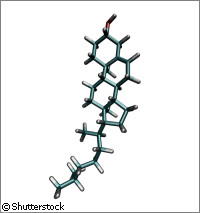Intensify study of lipids in Europe, experts urge
Leading European scientists have called for the study of lipids to be strengthened. In a report published by the European Science Foundation (ESF), they stress the crucial role those so-called 'fatty' molecules play in the healthy functioning of the human body as well as in the development of diseases. The main biological task of lipids lies in supporting the normal functioning of cells and tissues. They act as energy stores, help to maintain the structure of cells and participate in signalling processes. Cholesterol is the most commonly known lipid among thousands of the fat-soluble molecules at work inside the human body. However, 'most important is the fact that many of the wide-spread diseases that plague humankind involve lipids,' the report states. 'Prime examples are cardiovascular disease, obesity-related type 2 diabetes, and stroke. Other major diseases such as cancer and Alzheimer's disease also have lipid involvement.' In addition, inherited defects in lipid synthesis and storage can cause a number of other diseases. Lipids are also implicated as major factors in autoimmune diseases and are targets for bacteria, viruses and toxins. Therefore, the researchers argue that lipidomics, i.e. the identification and analysis of lipids in cells, tissues and body fluids, could contribute significantly to tackling a number of diseases. In order to give lipidomics research in Europe a boost, the report contains the following recommendations: - invest in research programmes aimed at training biomedical scientists in lipid-related fields; - invest in the further development of technologies for studying lipids, while establishing and maintaining strong links between technology developers and researchers; - develop a strong, coordinated and interdisciplinary research effort across Europe to understand lipid function and the roles of lipids in health and disease; - integrate European lipid databases and facilitate their communication with other databases worldwide. 'Lipidomics not only involves the study of lipids, but it also involves enzymes, transporters, genes, proteins, and their biophysics,' Professor Gerrit van Meer of Utrecht University in the Netherlands, one of the lead authors of the study, comments. 'The challenge is to unite all these different datasets and bring them together with disease pathology in one concentrated database.' According to Professor van Meer, this would provide invaluable new insights into diagnosing, monitoring and even curing disease. So far, lipidomics has not received a great deal of attention, the experts explain, because existing technology could not sufficiently analyse this class of molecule. Now that mass spectrometry permits the analysis of a large number of lipids in a short period of time, however, the scientists hope that this is about to change. 'This remarkable technological breakthrough will make it possible to better understand the cellular machineries that are responsible for producing and storing energy in cells, for the transport across and between cell membranes and for the signalling in and out of cells to name but a few examples,' the report states.



